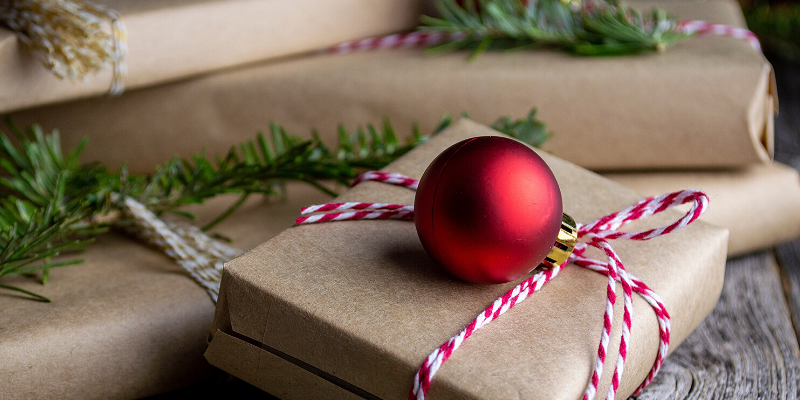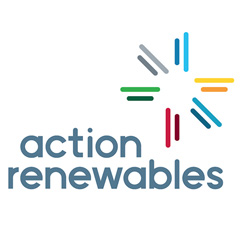Is it possible to have a green Christmas?

As the famous song tells us, ‘It’s the Most Wonderful Time of The Year’. However, is this festive season the most wonderful time of year for our planet?
In 2017, it was estimated that the UK would dispose over 100 million black bags of packaging waste from gifts and toys. But the waste did not stop at the packaging. It was also predicted that the UK alone would throw away 54 million platefuls of unwanted food during the season. These startling statistics suggest that Christmas is not the “hap-happiest season of all” for our planet.
So, is it truly possible to have a green Christmas? The answer is yes. Here are some tangible ways to help alleviate some of the stress placed on our environment this Christmas:
1. Parting ways with paper
An estimated 108 million rolls of wrapping paper found its way into UK bins during the 2017 Christmas aftermath. Therefore, how we wrap or don’t wrap our gifts is an important step towards a greener Christmas. Unfortunately, the majority of wrapping paper is laminated with plastic, or covered with foil and glitter, meaning, for the most part, it cannot be recycled. This year, try ditching your plastic-laden wrapping paper for brown paper. Brown paper is cheap and widely recyclable. You can even get crafty and add festive decorations. However, if you cannot bear to part ways with colourful gift wrap, try reusing where possible, as many presents received are often overwrapped. Better than that, why not try wrapping gifts with scarves or reusable bags, creating a gift within a gift. Check out the eco-friendly guide to gift wrap for more ideas.
2. Food for thought
It is incredible how much money we spend on food and drink at Christmas. Research from GoCompare Money reveals that the UK spent £4.7 billion on food and drink in 2018, which is an average of £172 per household. What is even more incredible, is how much of this we waste. A recent Unilever report stated that each year, over four million Christmas dinners are thrown away in the UK each year – that amounts to two million turkeys, 74 million mince pies and five million Christmas puddings! So this year, try to avoid overstocking your fridge and cupboards with perishables. Plan ahead, create a budget and only buy what you need. After all, supermarkets are only closed for 24 hours. Also make sure to utilise your freezer, as a significant proportion of our food can actually be frozen. Check out the Christmas guide to freezing for more tips. Finally, if it isn’t possible to preserve your leftovers, put them in a food waste caddy. Most homes in Northern Ireland now have a food caddy for recycling food waste which is far better than sending it to landfill.
3. Less is more with lights
There is no doubt that fairy lights are a much-loved part of our Christmas traditions. But less is certainly more when it comes to protecting the planet. For example, in London, Christmas lights total a massive 750,000 bulbs which are put up even before Halloween. The increase in lighting does not raise the spirits of local nocturnal wildlife either, animals such as bats, frogs and insects become disorientated with the sudden illuminations. Overall, light pollution disrupts ecosystems, affects sleep patterns, whilst wasting a lot of energy in the process. This year, try cutting down on the number of Christmas lights outside your house and enjoy a lower electricity bill in January, or even try solar-powered lights. Choose energy-saving LED bulbs and reduce the pressure put on the electricity grid. And, don’t forget to turn your lights off before going to bed, reducing the amount of energy you use, whilst keeping your household safe.
4. Shop local, not global
The internet has revolutionised the way we shop. Online shopping now makes up one in seven retail purchases worldwide. Whilst many online retailers would argue that this is the greener way to shop, the truth lies in the detail. When shopping online, it is very easy to forget just where our goods are coming from. Often, we are sending for items that have travelled hundreds of miles to end up at our front door, adding to our carbon footprint in the process. So next time you feel like splurging online, find out where it is coming from first. You may be able to buy the exact same product locally. Overall, the environmental benefits of shopping online come down to details we often overlook. So, to keep your carbon footprint as low as possible, whilst enjoying the ease of online shopping – try bundling your orders together and avoid making purchases on a whim which will reduce the need for a returns courier. Ultimately, the greenest purchase is the one that doesn’t happen.
5. Crackdown on crackers
Are you still using that plastic moustache you won in last year’s Christmas cracker? What about the tiny jigsaw puzzle? We don’t want to be a ‘humbug’ but should we rethink buying Christmas crackers? Across the world, crackers explode with single-use plastics each Christmas Day. Many of these so-called gifts and toys do not make it further than the table after dinner is over. They land in our bins without another thought. As part of a drive to combat single-use plastics in crackers, Waitrose and John Lewis have pledged to switch from plastic toys those made from recyclable materials like paper and metal by 2020. But don’t wait until then, let Christmas 2019 be the year you choose more sustainable Christmas crackers made from recycled or recyclable materials and plastic-free gifts, or you could make your own crackers. Even better, let Christmas 2019 be the year you realise crackers are not a yuletide essential.
A green Christmas may require greater thought and preparation, but hopefully, these five ideas have helped you realise that it is an obtainable and worthwhile goal. Happy Christmas!



